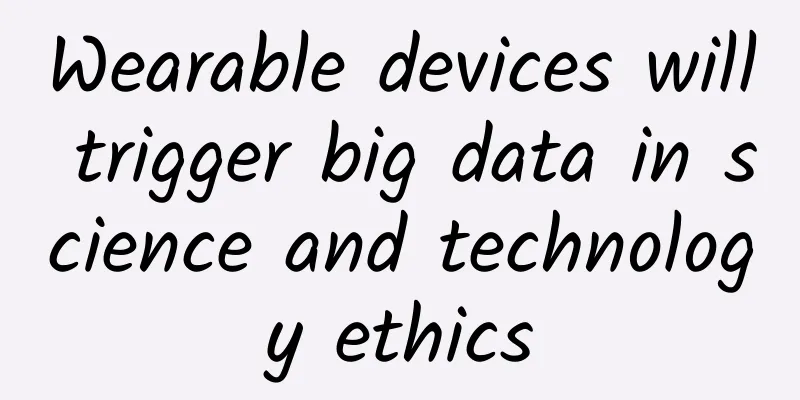Wearable devices will trigger big data in science and technology ethics

|
The ethical issues of wearable devices are also fermenting as the devices become more popular. The core of the problem is that wearable devices digitize people's vital body characteristics. In human history, every real technological innovation will trigger new ethical discussions and new moral standards. Obviously, the privacy ethics caused by big data is also at the forefront of discussion. The ethical issues of wearable devices are also fermenting with the popularization of devices. The core of this is that wearable devices digitize the characteristics of human life and body.
For example, Google Glass, which we are all familiar with, is only popular among a small number of people now, but the whole society has been discussing the ethical issues raised by smart glasses. It is not only about the privacy and theoretical issues raised by Google Glass in terms of usage scenarios, but more importantly, some "potential" problems "hidden" in the actual use of Google Glass. For example, the eye tracking technology can track the user's eyes and capture and record the order in which men look at women's bodies. Behind these privacy issues is an ethical discussion. Therefore, when wearable devices become as ubiquitous as mobile phones, what we are facing may not be as simple as privacy rights, and deeper ethical issues will be placed before us. As Viktor Mayer-Schönberger, author of "The Age of Big Data," worries, big data has been applied to the police industry in Europe and the United States. By analyzing a person's past behavior data through big data, it is predicted that he may become a murderer in two years. Should he be set free or should he be labeled a "murderer" now, monitored or directly thrown into prison? No one has been able to give an answer so far. It cannot be ignored that the era of big data based on wearable devices will face greater ethical issues. In the future, especially with the development of implantable wearable devices, when we are all implanted with built-in chips, when our consciousness can be rewritten, when our memory images can be reviewed at any time, our every move will be recorded. At this time, although we are all creators of big data, the more severe reality we face is that we are controlled by big data. With the integration of artificial intelligence and big data, perhaps in the future it will no longer be our own consciousness that controls us, but artificial intelligence. The Ethics of Wearable Devices: Privacy and Openness of Personal Information DataDuring the 2012 London Olympics, a British technology company placed 200 smart trash cans on the streets of London. The smart trash cans, which cost 30,000 pounds to build, are made of bulletproof materials and reduce the frequency of littering by passers-by. They also have network connection functions, and are equipped with Wi-Fi devices and two LCD screens, which are used to collect mobile phone user information and play commercial advertisements. The advertising display content can be updated in real time. Surprisingly, the wireless LAN positioning technology used by the smart trash cans can determine the specific model and specific MAC address of the smartphone carried by passers-by. After a week of testing, the company obtained data from more than 4 million smartphone users and confirmed the unique user information of 530,000 of them. Smart trash cans are not used to show the magic of high technology. Developers take advantage of the mentality of companies in fierce competition who are eager to seize business opportunities. They hope that related companies can use the mobile phone user data they collect to seize the niche market so as to directly place relevant advertisements to professional white-collar workers with higher incomes (see the figure below). For example, a coffee shop can track the Apple iPhones carried by passers-by on the road and determine that these people usually stop at 8 am to buy coffee and bread for breakfast. If users change their consumption habits and turn to other competitors to buy coffee and breakfast, the affected merchants will purchase advertising time slots played by smart trash cans. When a specific mobile phone user passes by the trash can, the system will match the number from the stored data and automatically push loyal customer reward programs or discount programs to specific users. As a result, big data poses a severe challenge to personal privacy protection. It seems that the data protection methods of traditional offline enterprises have become ineffective. As long as users use smartphones, they must transfer the ownership of their personal data to service providers. What is more complicated is that after multiple transactions and the intervention of multiple third-party channels, the boundaries of personal data rights have disappeared. Whether it is "showing off" your mood through social platforms such as Weibo and WeChat, or following and commenting on others, there is a possibility of leaking personal information, and you will be harassed by sales information and spam text messages, or even defrauded by criminals disguised as friends. With the increasing popularity of new technologies such as the Internet, smartphones, sensors, and personal wearable devices, the networking and transparency of personal data has become or will become an unstoppable trend. In the era of analog and small data, the only institutions that can control a large amount of personal data of citizens are government agencies with public power, but now many companies and some individuals can also have massive amounts of data, even surpassing government agencies in some aspects. Faced with such a trend, when wearables are deeply bound to the human body and widely popularized, they will inevitably generate a large amount of data. Most of this data is so-called private data. Faced with this data, where should the boundaries of its commercialization be drawn? This is no longer a simple issue of privacy rights, but involves some ethical issues involving the private lives of users. How to solve the battle between privacy and ethicsAlthough the advent of the wearable device era may expose everything about users to the sun, its trend is unstoppable and will not be affected by our willingness or unwillingness. When the Internet lifestyle becomes a common lifestyle in society, especially with the application of wearable devices, when we enter the era of the Internet of Things, the mobility and exposure risks of personal data have greatly increased. At the same time, big data may increase the potential risks of wearable device data to the extreme. In order to cope with unprecedented new risks, the most important thing is not to reject them, but to welcome them with an open mind and explore new regulatory methods. In my opinion, there are three main aspects: First, the software and hardware security technologies in data collection, transmission, storage and other aspects must be continuously improved to plug loopholes as much as possible from the source; The second is industry self-discipline. Especially for businesses that base their business models on the commercialization of big data, they need more moral self-discipline. Finally, we need to use laws and regulations to improve the legal system for personal data protection and the laws and regulations on data commercialization, including clear boundaries for data mining. The Decision of the Standing Committee of the National People's Congress on Strengthening Network Information Protection stipulates: "The state protects electronic information that can identify citizens' personal identities and involves citizens' personal privacy. No organization or individual may steal or obtain citizens' personal electronic information by other illegal means, or sell or illegally provide citizens' personal electronic information to others." In particular, after users submit personal data and accept agreed services, service providers and operators have the legal responsibility to protect personal data. In terms of the relationship between users and service providers, users are generally in a weak position with information asymmetry. Therefore, protecting the security of users' personal data is not only an unshirkable legal responsibility of service providers, but also an important social responsibility of enterprises. After rights are infringed, the effective implementation of rights relief is one of the signs of a modern rule of law society. The development of the industry is faster than the implementation of relevant laws and regulations, and to a certain extent, it has not played a real role in protecting user privacy, causing troubles to users to varying degrees. However, it is foreseeable that with the vigorous development of big data and wearable devices, the continuous emergence and improvement of relevant laws and regulations will inevitably guide the commercialization of the industry in a healthy direction, and at the same time, personal data privacy will be protected to a certain extent. Perhaps in the near future, when users use wearable devices, they can set the corresponding level according to their personal willingness to protect privacy, and use this to sell the corresponding personal data information to relevant demand parties. |
<<: Who is eating up the world?
>>: Test combination: Can Baidu MTC relieve your pain?
Recommend
Musk asked India to reduce taxes to support Tesla's factory construction, but local car companies in India collectively said No!
India's high taxes on imported cars have beco...
Chanel announced that it would stop production. How long will Chanel stop production?
Amid the global COVID-19 pandemic, luxury brands ...
Li Xiang: Tesla has already hit our doorstep, let’s stop making self-congratulatory propaganda about the 60-speed constant speed.
Today, Tesla launched the basic version of Model ...
Apple is also caught in the crossfire! 5 design issues that seriously affect user experience
[[144792]] Today's translation talks about so...
Strategy for building a headline advertising account!
How to build a perfect information flow advertisi...
Nonsense Questions and Answers: Snakes don’t have ears, so why would “beating the grass” scare the snake?
In the Harry Potter film series, There is a langu...
2019 China KOL Marketing Strategy White Paper!
Recently, iResearch Consulting and IMS New Media ...
The first batch of iPhone 12 users became "guinea pigs": countless people were caught in the crossfire of "signal failure"
"Everyone else has a signal, why don't I...
Started from scratch to play with Taobao community practice, and it took 6 months to increase the monthly commission from 0 to 10 million
How to start Taobao community from scratch: From ...
How to plan a screen-sweeping event, 4 tips!
How to plan a screen-sweeping event? Just read th...
There are 7 ways to promote on Xiaohongshu. Have you ever made a mistake?
"Little Red Book" is an emerging cross-...
What is short video operation? What does short video operation do?
The popularity of Tik Tok has redefined the mobil...
Huawei Honor 6 Indian media review: Reawaken your iPhone 4 memories
According to reports, Huawei Honor 6 has recently...
How to build a data operation system for a P2P platform?
It has been more than three years since I started...
Failed Mathematics! It turns out AI is also a student with a weak academic performance...
It's the time for the college entrance examin...









